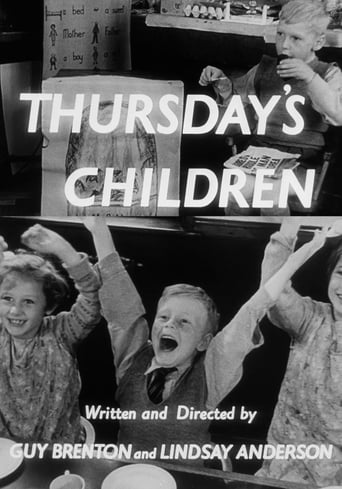



Dreadfully Boring
In truth, there is barely enough story here to make a film.
View MoreFanciful, disturbing, and wildly original, it announces the arrival of a fresh, bold voice in American cinema.
View MoreGreat example of an old-fashioned, pure-at-heart escapist event movie that doesn't pretend to be anything that it's not and has boat loads of fun being its own ludicrous self.
View MoreThis won the Academy Award for Documentary Short. There will be mild spoilers ahead:It gave me pause when I thought that the youngest of the children in this documentary (any of them still living) are 64 now. The teaching techniques used are, of course, no longer current, though the Royal School at Margate (established in 1792) is still active.The thing I found most fascinating is that the primary techniques shown were designed to try to help deaf children function in a world not readily designed for them and to interact with people who might not really want to make the time or effort to interact with them. Learning sign language is useful in a limited sense, in that it only works if the other party in the conversation speaks it as well. This is akin to learning any other language. One can no more "speak" sign language with someone not conversant in sign than you can speak German to someone who doesn't know German.At least with teaching children to lip read, they can have a chance to understand what is going on around them. It's imperfect, but so is every "remedy" which has been devised to overcome the limitations arising from deafness (or any other difficulty a person might need to handle in life).Full disclosure-I am disabled and use crutches and a wheelchair. I live in a world designed for the majority, which means I run into all sorts of obstacles which aren't obstacles to people who can walk without aids (which, interestingly enough, includes many deaf people).This is an extra on the Criterion release of Lindsay Anderson's ...If and is well worth seeking out. Recommended.
View MoreThe subject deals with the children at The Royal School for the Deaf in Margate, Kent. The hearing-handicapped children are shown painstakingly learning what words are through exercises and games, practicing lip-reading and finally speech. Richard Burton's calm and sometimes-poetic narration adds to the heartwarming cheerfulness and courage of the children.Pretty much as it sounds, this was how deaf children were taught in Britain in the 1950s. I do appreciate that the film starts with a disclaimer that children are no longer taught this way. I was thinking they were warning me of some bad treatment I was going to see, but there was nothing offensive in the documentary at all.
View MoreNowadays, Lindsay Anderson's short documentary about children at a school for the deaf is probably of more interest for what it reveals about attitudes during the 1950's than for its own sake. The film shows how these children are taught to lip-read and to vocalize, and it is interesting to see how it was done. The two teachers shown in the film clearly love their work and the children, and do their jobs with an almost saintly patience. The children are shown as bright, happy, and enthusiastic -- although we see the occasional failure, we never see how the children react to the inevitable frustration that they must have experienced.For those of us who watch the film nowadays, from a perspective of more than half a century, it is hard not to start wondering about the social attitudes toward the deaf that were current at the time the film was made. For example, no effort is made to teach the children sign language (or at least if there is, we never see any evidence of such an effort), even though they openly admit that the school's teaching methods only succeed with one child in three. And one would hope that nowadays, the teacher would find something other than _Little Black Sambo_ to read to the children.
View MoreBrilliant Oscar-winning documentary about a school for deaf children. One of - the sometimes slightly grumpy - Lindsay Anderson's more altruistic and poetic moments. The film is almost completely silent (with music and narration, though), which gives you a good sense of how these children must perceive the world around them. For years it was almost impossible to find this wonderful little movie other than on 16mm film, but in 2007 the Criterion edition of Anderson's masterpiece 'if....' included 'Thursday's Children' as a bonus. The film is narrated by Richard Burton and was co-directed by Guy Brenton. Anderson shot this simultaneously with another short, the satirical amusement park portrait 'O Dreamland' (1953).
View More